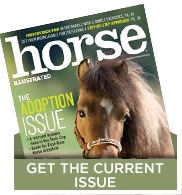Tiny sparkles of white dust whirl through the air as I whisk the dirt off of Daisy’s golden hide. There are only fifteen minutes until the lesson starts, and little Sadie will be here in ten or less. Her mother always arrives early to update Ms. Samantha about her daughter’s behavior throughout the week. Knowing my time constraints, I quickly run the brush over the mare’s coat and then stoop to grab a hoof pick. Less than three minutes later, I am smoothing a teal saddle pad onto Daisy’s broad back and hoisting the heavy, bulky western saddle up over my head. When I ride, I prefer the freedom of my hunter saddle, but Western saddles are more secure for riders like Sadie. Not that security is much of an issue, because for the entire three years I have volunteered at Liberty Leads Equestrian Center, I have never seen the sweet, reliable Belgian draft mare spook once. When it comes to therapeutic riding, though, it is always better to be safe than sorry. With that in mind, I clip a lead line onto Daisy’s leather halter and lead her to the indoor riding arena outside of the barn. As we march down the barn aisle, Daisy’s giant unshod hooves clip-clopping, Samantha sticks her head out of her office and beams a bright smile that can entice even the shiest of children at me.
Upon entering the spacious riding ring, I take Daisy for a lap around to get her warmed up for the lesson before stopping to tighten the cinch. I wonder if today will be Sadie’s Big Day. Sadie is a petite, doe-eyed five year old who was diagnosed with Autism when she was only three years old, and in her entire life, she has never so much as whispered a word. She uses sign language to communicate, which is an improvement; when she was younger, she would cry or scream to get her message across. We know that she has a voice because she has demonstrated her ability to yell, but it seems like there is some wall, a mental block of sorts, that prevents her from speaking. Our hope is that this is merely a delay and that with the aid of Ms. Samantha, a certified therapeutic riding instructor and speech therapist, Sadie will learn to talk. Each lesson I wonder if she will decide to utter her first word on the back of her horse. I have heard of it happening at Liberty Leads, but I’ve never seen anything so astounding with my own eyes.
“Ready to ride today, Sadie? Daisy is waiting for you,” a sugary sweet voice croons. It’s Anne, Sadie’s sidewalker. Anne is a middle aged woman who devotes much of her time to volunteering at the Center. She is responsible for keeping Sadie planted firmly in the saddle, and for being her “human airbag” if she is in danger of falling off. In addition, she helps Sadie with any activities and sometimes plays games with her throughout the lesson. Tiffany, a timid teenage girl, is Sadie’s other sidewalker. She holds Sadie’s hand as they walk, although Sadie seems determined to plow ahead. Ms. Samantha enters directly behind them.
“Okay, ladies, let’s get started. Emily, you can bring Daisy over to the mounting block now,” she says in a manner that suggests she is accustomed to being in charge.
I cluck to Daisy and we walk to the block just outside of the gate, where I park her and turn to stand facing her head so she doesn’t move forward. Anne stands on the far side, while Tiffany helps Sadie walk up the steps of the mounting platform so she can get on.
“Alright, put your foot in the stirrup and swing your leg across,” Ms. Samantha coaches. Though some riders require lots of assistance or even need to be lifted on, Sadie is fairly well balanced and basically mounts on her own. Tiffany stands beside her to ensure that she lands gently in the saddle.
“Hi, Sadie,” I smile at her. She seems focused, her big blue eyes gazing intently into the ring.
“Tell your horse to walk on, please,” Ms. Samantha says. Sadie makes a paddling motion in the air with her hands, which is her way of telling Daisy to walk forward. I step back into my leading position at Daisy’s side and we walk through the gate. After doing the necessary girth and stirrup checks, Samantha explains to Sadie what we are going to do.
“Today we’re going to play a game. I accidentally left a few of my animals all around the arena, and I need you to help me find them and bring them back to their basket. But here’s the tricky part- you have to tell Daisy when to whoa and when to walk on, okay, Sadie?” Sadie doesn’t respond, but signals for Daisy to walk.
“Good job!” Anne encourages. As Daisy steadily plods around along the rail, I scan the ledge on the wall for animals. A couple of feet ahead, I spot a stuffed horse.
“Look, Sadie, do you see that? It’s a horse! How are you going get it? Do you need Daisy to stop so you can grab it?” I ask. She isn’t paying attention now. Her eyes have wandered to the ceiling.
“Sadie, we’re almost beside him. What are you going to do? How are you going to stop your horse?” Tiffany tries to grab her attention to no avail. Daisy keeps on walking and I make no effort to stop her as we pass the toy. Sadie has to learn to communicate what she wants, and that won’t happen if I do everything for her.
“Uh-oh, looks like you missed one. You better be paying attention, Sadie! The animals are lonely out there by themselves. They need you to help them,” Samantha tells her. We continue walking, and soon I spy a cat.
“Hey, Sadie, there’s a kitty! That’s your favorite animal, isn’t it? Here kitty, kitty!” I call. I have caught Sadie now; all of her attention is riveted on the cat.
“What do you tell Daisy?” Anne asks. “You say-“
“Whoa.” The voice is small and slightly shaky. For a second I’m not even sure I heard it, but sure enough, Daisy is no longer walking. Each of us stares open-mouthed. It haw always been our goal to get Sadie to talk, but I don’t think any of us really expected it to happen. Except Ms. Samantha, it seems.
“Great job, Sadie! That’s exactly it! I’m so proud of you! Mrs. Wright, did you hear that? Sadie just told Daisy to whoa!” her lilting voice exclaims. I look over at Sadie’s mother. Tears are streaming down her face.
“Thank you, thank you,” she is burbling.
Even though I am in major shock, I know that this is one of the most beautiful moments I have ever experienced. I have always heard about the miracles that therapeutic horsemanship can do, but now I have seen the healing power of horses firsthand.
Sadie just sits in the saddle. She doesn’t seem to understand what all the fuss is about. And then Samantha is saying, “Well, let’s keep playing.”
Throughout the rest of the lesson, Sadie does not speak again, but this triumphant moment is a huge leap of progress. They say the first step is always the hardest, so things can only get better from here.
After the lesson, I take Daisy back to her stall and remove her tack. “Good girl,” I murmur as I work. “What a saint you are.”
Tiffany, Anne, Samantha, and Mrs. Wright all gather around the stall as Sadie feeds Daisy a carrot out of a bucket. “Thank you so much, all of you,” Mrs. Wright meaningfully makes eye contact with each of us. Her eyes still glisten with tears of joy. “This means so much to me, and I can never repay you for what you have done for my daughter.”
“This is why I do what I do. I wouldn’t trade a moment like that for anything,” Samantha replies. Anne and Tiffany nod in agreement.
I stroke Daisy’s neck. “And we owe it all to this girl,” I smile.
“To Daisy,” Mrs. Wright agrees. “The miracle mare.”
Read all ten finalists’ entries from HorseChannel’s 2013 Fiction Contest >>




